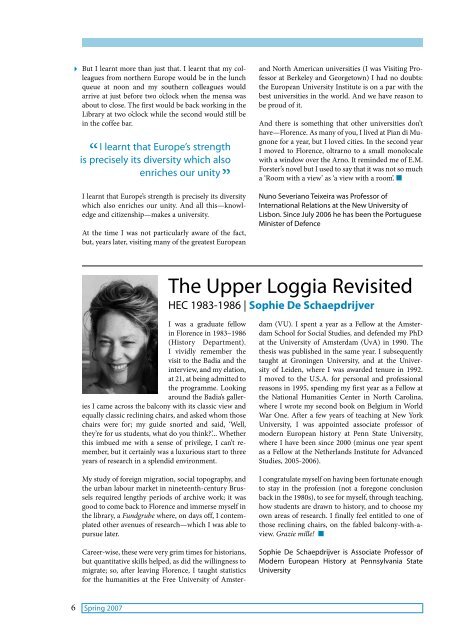Spring 2007 - European University Institute
Spring 2007 - European University Institute
Spring 2007 - European University Institute
You also want an ePaper? Increase the reach of your titles
YUMPU automatically turns print PDFs into web optimized ePapers that Google loves.
}<br />
But I learnt more than just that. I learnt that my colleagues<br />
from northern Europe would be in the lunch<br />
queue at noon and my southern colleagues would<br />
arrive at just before two o’clock when the mensa was<br />
about to close. The first would be back working in the<br />
Library at two o’clock while the second would still be<br />
in the coffee bar.<br />
“ I learnt that Europe’s strength<br />
is precisely its diversity which also<br />
enriches our unity ”<br />
I learnt that Europe’s strength is precisely its diversity<br />
which also enriches our unity. And all this—knowledge<br />
and citizenship—makes a university.<br />
At the time I was not particularly aware of the fact,<br />
but, years later, visiting many of the greatest <strong>European</strong><br />
I was a graduate fellow<br />
in Florence in 198 –198<br />
(History Department).<br />
I vividly remember the<br />
visit to the Badia and the<br />
interview, and my elation,<br />
at 1, at being admitted to<br />
the programme. Looking<br />
around the Badia’s galleries<br />
I came across the balcony with its classic view and<br />
equally classic reclining chairs, and asked whom those<br />
chairs were for; my guide snorted and said, ‘Well,<br />
they’re for us students, what do you think?’... Whether<br />
this imbued me with a sense of privilege, I can’t remember,<br />
but it certainly was a luxurious start to three<br />
years of research in a splendid environment.<br />
My study of foreign migration, social topography, and<br />
the urban labour market in nineteenth-century Brussels<br />
required lengthy periods of archive work; it was<br />
good to come back to Florence and immerse myself in<br />
the library, a Fundgrube where, on days off, I contemplated<br />
other avenues of research—which I was able to<br />
pursue later.<br />
Career-wise, these were very grim times for historians,<br />
but quantitative skills helped, as did the willingness to<br />
migrate; so, after leaving Florence, I taught statistics<br />
for the humanities at the Free <strong>University</strong> of Amster-<br />
<strong>Spring</strong> <strong>2007</strong><br />
and North American universities (I was Visiting Professor<br />
at Berkeley and Georgetown) I had no doubts:<br />
the <strong>European</strong> <strong>University</strong> <strong>Institute</strong> is on a par with the<br />
best universities in the world. And we have reason to<br />
be proud of it.<br />
And there is something that other universities don’t<br />
have—Florence. As many of you, I lived at Pian di Mugnone<br />
for a year, but I loved cities. In the second year<br />
I moved to Florence, oltrarno to a small monolocale<br />
with a window over the Arno. It reminded me of E.M.<br />
Forster’s novel but I used to say that it was not so much<br />
a ‘Room with a view’ as ‘a view with a room’. n<br />
Nuno Severiano Teixeira was Professor of<br />
International Relations at the New <strong>University</strong> of<br />
Lisbon. Since July 2006 he has been the Portuguese<br />
Minister of Defence<br />
The Upper Loggia Revisited<br />
HEC 1983-1986 | Sophie De Schaepdrijver<br />
dam (VU). I spent a year as a Fellow at the Amsterdam<br />
School for Social Studies, and defended my PhD<br />
at the <strong>University</strong> of Amsterdam (UvA) in 1990. The<br />
thesis was published in the same year. I subsequently<br />
taught at Groningen <strong>University</strong>, and at the <strong>University</strong><br />
of Leiden, where I was awarded tenure in 199 .<br />
I moved to the U.S.A. for personal and professional<br />
reasons in 1995, spending my first year as a Fellow at<br />
the National Humanities Center in North Carolina,<br />
where I wrote my second book on Belgium in World<br />
War One. After a few years of teaching at New York<br />
<strong>University</strong>, I was appointed associate professor of<br />
modern <strong>European</strong> history at Penn State <strong>University</strong>,<br />
where I have been since 000 (minus one year spent<br />
as a Fellow at the Netherlands <strong>Institute</strong> for Advanced<br />
Studies, 005- 00 ).<br />
I congratulate myself on having been fortunate enough<br />
to stay in the profession (not a foregone conclusion<br />
back in the 1980s), to see for myself, through teaching,<br />
how students are drawn to history, and to choose my<br />
own areas of research. I finally feel entitled to one of<br />
those reclining chairs, on the fabled balcony-with-aview.<br />
Grazie mille! n<br />
Sophie De Schaepdrijver is Associate Professor of<br />
Modern <strong>European</strong> History at Pennsylvania State<br />
<strong>University</strong>

















